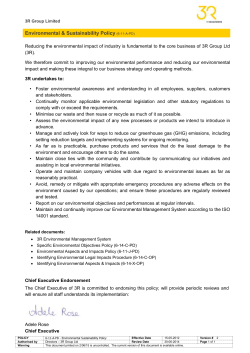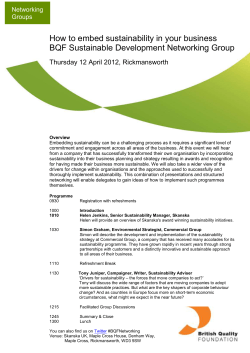
2014 was an exciting year for progress and innovation in
2014 was an exciting year for progress and innovation in sustainability. Some of the world’s biggest corporations (including many in direct competition with each other) got together to form Collectively.org, an online platform aimed at Millennials which moves away from “green-speak” to a much hipper, relevant voice designed to inspire rather than dishearten. Elsewhere, programs such as the Sustainable Stock Exchanges Initiative continued to grow its members, helping keep sustainability high on the agenda for business leaders and investors everywhere. Indeed, sustainability has now become a key part of many companies’ annual reports, with the recognition that it covers not just environmental concerns, but wider health and well-being responsibilities as well. In the U.S., the majority of this change is coming from within businesses themselves, without waiting for government regulation. This both speaks to our collective entrepreneurial, innovative spirit, and the recognition that it’s both ethically and economically the right thing to do. On a macro level, according to the Future Today report from the United Nations Environment Programme (www. unep.org), “Investing in environmental and social sustainability does not impair economic development, but results in equally large and more equitably distributed economic growth on a per capita basis in most regions as those that do not.” From a minority- and woman-owned business point of view, it is even more urgent as this insight from an Intuit 2020 report suggests. Sustainability will become a “competitive requirement for small business within the next ten years, moving from social novelty to business necessity.” With that in mind, here are my thoughts on which trends to adopt in 2015 to keep your business lean, competitive, and sustainable. 26 January/February 2015 MBE 1. Cut down on your energy consumption. This is one trend that’s here to stay. There are many ways you can instantly start to save on energy costs, including turning off all office equipment at the end of the day, ditching screensavers, and lowering the thermostat by just one degree. Make sure your lighting is LED and not halogen, and consider installing timers to light switches to ensure they don’t needlessly stay on all night. It’s also worth contacting your energy supplier for more insights and information on ways in which you can monitor your usage to avoid any surprise sky-high bills. 2. Committing to sustainability to attract top talent. I have written previously about the importance of strong corporate social responsibility in attracting Millennials. According to research conducted by LinkedIn (“Engaging Millennial Employees”), Millennials’ comprise roughly 50 percent of the workforce today, and will rise to 75 percent by 2025, meaning this is a long-term trend. It’s, therefore, important to make your sustainability credentials clear and real during the hiring process, from the website to the interview questions to sharing the opportunity for employee engagement in contributing to sustainability initiatives. 3. Sustainability success through employee engagement. While it is very important to have a leadership position to help set goals and define strategy, it’s vital that employees have the opportunity to voice their ideas for innovation, and feel a sense of ownership in the ultimate outcome. Many sustainability efforts lose their way or simply fail because there is no transparency between goal, action, and result. Further, sharing ideas and success stories helps sustainability initiatives gain momentum, inspiring better and more innovative ideas which lead to greater efficiencies and cost savings. way through every element of our lives; it isn’t something “other.” By moving on from “green”, from “can’t” to “can do”, sustainability becomes about innovation. 5. Sustainability as a business development tool. Whichever way you look at it, a sustainable mindset is good for business as well as the environment. It’s about doing more with less, and being more effective as a consequence. It’s about being smart and strategic and turning positive thought into positive action. Having a sustainable focus means companies are mitigating risk and making themselves resilient. Ultimately, it’s about delivering value in a very real sense, which in terms of attracting and retaining clients is a highly desirable quality. Let 2015 be the year that sustainability becomes a central part of your business, I guarantee you won’t regret it. ◆ Want to put sustainability into action? Check out these sites 4. The new language of sustainability. As sustainability becomes an increasingly common goal, for businesses both large and small, I believe the way in which we talk about sustainability and our creative approach to it will become much more sophisticated. As Collectively.org has powerfully shown, the desire to live more sustainably weaves its Barbara Wichmann is the founder and CEO of ARTÉMIA Communications and a recipient of the 2014 WBENC Star Award. MBE January/February 2015 27
© Copyright 2025





















